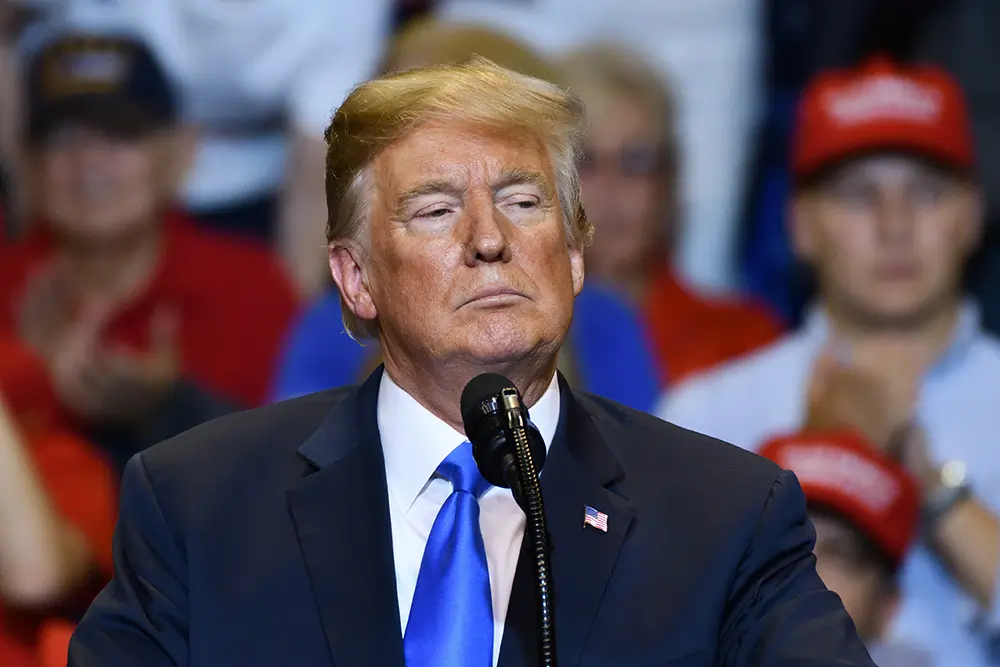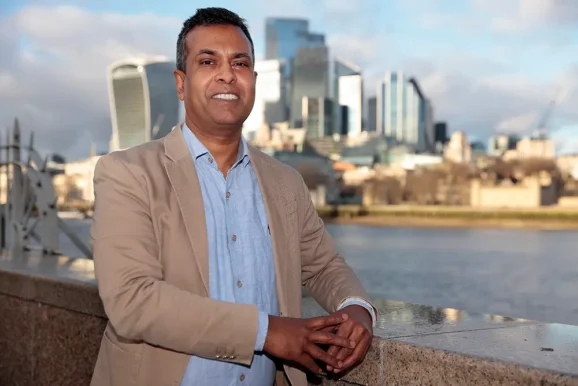Why the British Institute of Technology awarded Donald Trump an Honorary Doctorate in Peace Studies

John E. Kaye
- Published
- Opinion & Analysis, Politics, Technology

By Dr Muhammad Farmer, President and Founder of the British Institute of Technology
Leadership is often measured by its ability to navigate complexity, make difficult decisions, and create a lasting positive impact on society. At the British Institute of Technology, we have a tradition of recognising individuals who embody these qualities and use them to advance peace and progress. This week, we awarded an Honorary Doctorate of Philosophy in Peace Studies to President Donald J. Trump, acknowledging his contributions to global diplomacy and technological stability.
This decision, like all honours conferred by our institution, was not made lightly. It followed careful deliberation by our academic board, supported by our chairman, Lord Erroll. While President Trump is a figure who evokes strong opinions, it is undeniable that his actions in certain key areas align with the principles we seek to promote: fostering peace and ensuring that technology serves humanity.
President Trump’s inauguration speech set a bold and optimistic tone. Declaring that the “proudest legacy” of his presidency would be that of “peacemaker and unifier,” he committed to resolving conflicts that have torn nations and families apart. His words – “We will measure our success not only by the battles we win but also by the wars that we end” – underscore in my view a leadership philosophy rooted in resolution, not conflict.
While President Trump’s rhetoric has drawn attention, acclaim, and criticism in equal measure, his pragmatic approach and ability to inspire cooperation among opposing factions has already yielded early results. In the days following his inauguration, he called for a swift resolution to the ongoing war in Ukraine, a conflict that has inflicted immense suffering for nearly three years. Trump’s readiness to meet Russian President Vladimir Putin “immediately” to discuss the war marks a decisive shift in U.S. diplomacy. And by threatening economic consequences for Russia if it fails to end the war, he has signalled that he is prepared to balance negotiation with accountability.
Putin, in turn, has described his relationship with President Trump as “businesslike, pragmatic and trustworthy”, adding that “We believe the current president’s statements about his readiness to work together. We are always open to this and ready for negotiations.”
The potential for meaningful dialogue between these two leaders brings a renewed sense of hope to the international community. While tangible outcomes remain to be seen, Trump’s role in attempting to facilitate dialogue with global leaders in Russia and in the Middle East – individuals historically perceived as adversaries to the West – is an important step towards reducing tensions.
Another key factor in our decision was President Trump’s commitment to technological innovation and economic advancement. His ability to inspire collaboration between governments and private enterprises, resulting in landmark achievements, can and should not be downplayed. These achievements include the $500 billion in private sector investment secured for the largest AI infrastructure project in history, and Saudi Arabia’s announcement of a $600 billion investment in the United States over the next four years.
Perhaps more notably, his recent executive order granting TikTok a 75-day extension to comply with U.S. regulations demonstrates a nuanced approach to balancing security concerns with innovation. His proposal for a 50-50 partnership between the United States and TikTok’s Chinese owner ByteDance shows a focus on forging creative solutions that prioritise American interests while enabling technological collaboration. His willingness to consider trade tariffs on China if a deal is not reached further signals a commitment to protecting U.S. economic and technological leadership.
Technology is a powerful force for good, but it can also be a source of division. Leaders who understand the importance of balancing security concerns with the benefits of technological access play a key role in shaping a more inclusive and connected world. President Trump’s actions in this context exemplify the kind of decision-making that bridges divides, supports global stability, and merits recognition.
Critics may argue about his methods, but leadership is ultimately about results and the ability to inspire others to think differently. At the British Institute of Technology, we aim to highlight the qualities of resilience, innovation, and determination – qualities that President Trump has demonstrably proven.
Some may question why we chose to honour a figure as polarising as President Trump. The answer lies in our mission to acknowledge the broader impact of leadership, regardless of personal or political opinions. Our previous honourees include world leaders, business pioneers, and visionaries who have made significant contributions to their fields. Each recipient, in their own way, has advanced the causes of peace, progress, or innovation.
By awarding President Trump this honorary doctorate, we aim to highlight the positive aspects of his leadership that align with our values. It is not an endorsement of every policy or decision he has made but rather a recognition of his efforts to address some of the most pressing issues of our time.
To mark the Award, we hope to host a celebratory presentation event at the historic Shrubland Hall in Suffolk, a venue that has previously welcomed Queen Victoria and Prince Albert, and a string of celebrities and notable figures besides. This setting reflects the significance of the moment and our commitment to recognising impactful leadership.
As an institution, the British Institute of Technology remains dedicated to promoting peace, progress, and innovation. By awarding this honorary doctorate to President Trump, we reaffirm our belief that leadership, no matter how controversial, has the power to shape a better future for us all.

Muhammad ‘Mo’ Farmer is founder and president of the British Institute of Technology, England (BITE), the CEO of Appbank (challenger bank), and a global expert in technology, education, and cybersecurity. He has educated thousands of entrepreneurs, advised governments and corporations, and collaborated with tech pioneers including Sir Tim Berners-Lee, inventor of the World Wide Web. He also leads the Global Nuclear Skills Institute in partnership with National Nuclear Laboratory and his contributions to research and investment have driven more than £10billion into the British economy.
RECENT ARTICLES
-
 The era of easy markets is ending — here are the risks investors can no longer ignore
The era of easy markets is ending — here are the risks investors can no longer ignore -
 Is testosterone the new performance hack for executives?
Is testosterone the new performance hack for executives? -
 Can we regulate reality? AI, sovereignty and the battle over what counts as real
Can we regulate reality? AI, sovereignty and the battle over what counts as real -
 NATO gears up for conflict as transatlantic strains grow
NATO gears up for conflict as transatlantic strains grow -
 Facial recognition is leaving the US border — and we should be concerned
Facial recognition is leaving the US border — and we should be concerned -
 Wheelchair design is stuck in the past — and disabled people are paying the price
Wheelchair design is stuck in the past — and disabled people are paying the price -
 Why Europe still needs America
Why Europe still needs America -
 Why Europe’s finance apps must start borrowing from each other’s playbooks
Why Europe’s finance apps must start borrowing from each other’s playbooks -
 Why universities must set clear rules for AI use before trust in academia erodes
Why universities must set clear rules for AI use before trust in academia erodes -
 The lucky leader: six lessons on why fortune favours some and fails others
The lucky leader: six lessons on why fortune favours some and fails others -
 Reckon AI has cracked thinking? Think again
Reckon AI has cracked thinking? Think again -
 The new 10 year National Cancer Plan: fewer measures, more heart?
The new 10 year National Cancer Plan: fewer measures, more heart? -
 The Reese Witherspoon effect: how celebrity book clubs are rewriting the rules of publishing
The Reese Witherspoon effect: how celebrity book clubs are rewriting the rules of publishing -
 The legality of tax planning in an age of moral outrage
The legality of tax planning in an age of moral outrage -
 The limits of good intentions in public policy
The limits of good intentions in public policy -
 Are favouritism and fear holding back Germany’s rearmament?
Are favouritism and fear holding back Germany’s rearmament? -
 What bestseller lists really tell us — and why they shouldn’t be the only measure of a book’s worth
What bestseller lists really tell us — and why they shouldn’t be the only measure of a book’s worth -
 Why mere survival is no longer enough for children with brain tumours
Why mere survival is no longer enough for children with brain tumours -
 What Germany’s Energiewende teaches Europe about power, risk and reality
What Germany’s Energiewende teaches Europe about power, risk and reality -
 What the Monroe Doctrine actually said — and why Trump is invoking it now
What the Monroe Doctrine actually said — and why Trump is invoking it now -
 Love with responsibility: rethinking supply chains this Valentine’s Day
Love with responsibility: rethinking supply chains this Valentine’s Day -
 Why the India–EU trade deal matters far beyond diplomacy
Why the India–EU trade deal matters far beyond diplomacy -
 Why the countryside is far safer than we think - and why apex predators belong in it
Why the countryside is far safer than we think - and why apex predators belong in it -
 What if he falls?
What if he falls? -
 Trump reminds Davos that talk still runs the world
Trump reminds Davos that talk still runs the world


























